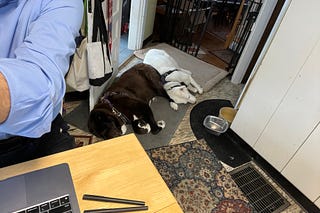Doctors predictably get themselves into trouble when they prescribe controlled substances for themselves.
In an earlier era that was a common practice, partly perhaps because doctors were solo practitioners far apart from each other, and perhaps also because doctors were thought to be able to handle the conflict of interest of being their own providers.
The Latin “Sig” “Ad Usum Proprium” means “for personal use”, but it is often confused with “as directed”. In the EMRs I have seen, that is not in the drop down choices for electronic prescriptions.
These days any self prescribing is discouraged, but I think we should promote some kinds of it: I think doctors should treat themselves more often when it comes to diet and exercise prescriptions.
We are witnessing an epic shift in the health of our nation. Overall life expectancy and healthy life expectancy are decreasing in my generation, the baby boomer cohort.
This deterioration of our nation’s health status is fueled in part by the food and snack industry and the comfort and convenience concepts of the postindustrial sedentary American lifestyle.
The misinformation about what constitutes healthy living, in particular when it comes to food choices, is colossal, and few people have the insight and wherewithal to navigate through this. This is where well educated health professionals may offer a glimmer of hope for a shift for the rest of the population.
I think healthcare providers need to use all the influence we have left in the fight against junk food and physical inactivity, not only in what we say but also what we do.
We need to speak out against consumption of high fructose corn syrup, boxed breakfast cereals and instant oatmeal, snack crackers, pretzels, Pringles, Cheetos, Little Debbies, Twinkies, Pop Tarts, breakfast bars, milkshakes, chicken nuggets, French Fries and a whole host of restaurant and fast food favorite meals.
The list goes on, and the literature is out there. As I used to tell my mother when I was a picky young eater who didn’t like complicated dishes: “I want straight food” (Jag vill ha rak mat). It is almost axiomatic that food that is prepared with minimal processing and without unnatural ingredients is the healthiest and probably best suited choice given our genetic makeup.
Are we talking enough about this with our patients? Do we buy into the fact that such conversations can make more difference in our patients’ health than our medication prescriptions? And to what degree are we really paying attention to this in our personal lives? Are we walking the walk, not just talking the talk?
Resources:
High Fructose Corn Syrup exposes humans to unnatural quantities of fructose:
https://www.healthline.com/nutrition/why-high-fructose-corn-syrup-is-bad
Palm oil’s health risks are a bit controversial but environmental impact of its production is clearly negative:













